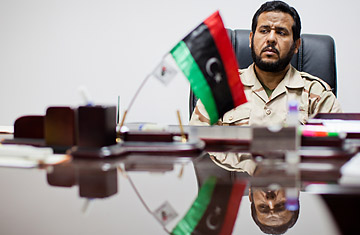
Abdel Hakim Belhaj, commander of the Tripoli Military Council, looks on during an interview on September 1, 2011 in Tripoli, Libya.
Updated, Sept. 2, 8:35 p.m. EDT
A treasure trove of hundreds of thousands of secret documents uncovered by TIME and several other news organizations in the Libyan capital on Friday apparently reveals that the CIA and Britain's MI6 maintained a close — even intimate — relationship with their Libyan counterparts dating as early as 2002, before the CIA had set up a "permanent" mission in Libya (which, according to the documents, began in 2004). United Nations sanctions were lifted in September 2003. U.S. economic sanctions ended in Sept. 20, 2004.
Binders full of correspondence sent by the CIA and MI6 to Libyan intelligence and, often specifically, Moussa Koussa, who was Muammar Gaddafi's longtime right-hand man, reveal that the western intelligence agencies worked closely with the Libyans on the renditions of terrorism suspects to Libya for questioning between 2002 and 2004. (Correspondence before and after those dates were not immediately available.) According to the documents, the CIA appears to have expressed interest in participating in the interrogations on Libyan soil. A 2004 letter to Moussa Koussa from CIA operative "Steve," regards "setting up a permanent CIA presence in Libya." But the documents seem to make clear that the relationship has already existed for some time. "We are also eager to work with you in the questioning of terrorists we recently rendered to your country," Steve writes. "I would like to send to Libya an additional two officers and would appreciate if they could have direct access to question this individual."
In Washington, CIA spokesperson Jennifer Youngblood said, "It can't come as a surprise that the Central Intelligence Agency works with foreign governments to help protect our country from terrorism and other deadly threats. That is exactly what we are expected to do." Meanwhile, a U.S. official said: "Let's keep in mind the context here. By 2004, the US had successfully convinced the Libyan government to renounce its nuclear weapons program and to help stop terrorists who were actively targeting Americans in the U.S. and abroad." The official added: "There are lots of countries willing to take terrorists off the street who want to kill Americans. That doesn't mean U.S. concerns about human rights are ignored in the process."
The documents were recovered in what appears to have been an office used by Moussa Kouassa in an unmarked building in Tripoli. The rebels guarding it were unsure of whether the building belonged to the Libyan Foreign Ministry, or another agency, but many of the documents were marked "External Security."
Types of Documents
Among the documents found were rendition proposals, rendition schedules, a speech drafted for Gaddafi by MI6 about making the Middle East "a WMD free zone," lists of terrorist suspect interrogation questions requested by the CIA, wire taps of foreign embassies, Libyan telephone numbers intercepted by and provided by the CIA to Libyan authorities, as well as transcripts of terrorism suspect interrogations — including a 400-page file detailing interrogations of current Libyan rebel commander in Tripoli, and former member of the Libyan Islamic Fighting Group, Abdel Hakim al-Khulidi Belhaj.
The CIA and MI6 apparently trusted their Libyan counterparts enough to offer detailed information on Arabs outside of Libya upon request by Libyan authorities — even when the U.S. and British intelligence agencies did not see the specified individuals as threats. In one note dated Feb. 23, 2004, Libya seems to have requested information on a Kuwaiti individual. The CIA doesn't see him as posing any danger, it says. But it provides detailed information on that man's role in Kuwaiti politics anyway.
The CIA also apparently provided their Libyan counterparts with intelligence on specific Libyans that they were interested in, so as to facilitate their capture. The intelligence appears to include lists of Libyan phone numbers attached to specific suspect names, aliases, passport and their suspected locations.
And the CIA seemed to have shared other intelligence too with the Libyans, ranging from information on packages intercepted in Turkey that allegedly carried Tunisian passports to profiles of "key North Africans" in Pakistan and Afghanistan to details between meetings of the Swedish Security Service and a Libyan contact code named "Joseph."
Files in Arabic detailed correspondence with other Arabic-speaking countries and factions with which Col. Muammar Gaddafi's government did business. That included armed groups that Libya funded in return for help in providing mercenary services within Libya.
One document appears to be an undated draft letter in Arabic from Libya's External Security Service to the Salvation Front of Somalia, the latter, according to the letter, "formed because of the Libyan people under the command of the Brother Leader and the father of Muammar Gaddafi." Then the letter gets to the point: "We'd like to call in a few favors ... [requesting] at least 10,000 jihadis [to come to Libya,] mostly rocket specialists and anti-aircraft machine gun specialists..."
